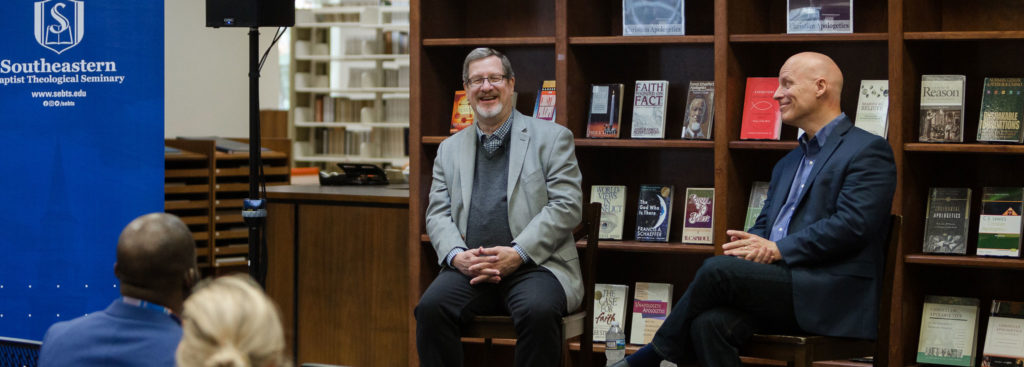Author and apologist Lee Strobel addresses students during Page Lecture Series
Lauren Pratt | November 26, 2019

Lee Strobel remembers November 9, 1981 well. It was the day after he moved from being a self-proclaimed atheist to a follower of Christ.
As he walked into the newsroom for his job as a legal editor for the Chicago Tribune, he had a different perspective. He noticed the lack of religious diversity that existed in the room, and he only knew of a handful of other Christians in his workplace.
Strobel, author of “The Case for Christ” and more than 40 other books, talked about how Christians should engage today’s culture in an increasingly skeptical world. While on campus for Southeastern Baptist Theological Seminary’s (SEBTS) annual Page Lecture Series, Strobel provided four ways in which Christ exemplified how to be salt and light among the lost.
First, Jesus prayed to God the Father about his neighbor before talking to his neighbor about God the Father.
Strobel told the story of a woman in his church who had been praying for her brother for nine years before she finally saw him come to faith in the baptismal pool with his wife one Sunday. Strobel challenged students to never stop praying for those they are seeking to reach.
Second, Jesus would let his neighbors know that his door is always open for questions.
“The key word is not debate; it’s dialogue,” said Strobel. While sometimes debating is beneficial, most people need to consider having conversations with their neighbors that involve more listening than talking.
Third, Jesus wouldn’t just share his faith; he would show his faith.
“When we sacrificially serve as Jesus did, it cracks open the hardest of hearts,” said Strobel.
Fourth, Jesus would be authentic in the way he communicated the gospel, embodying its message.
“If we love God and love people, he will take us on a series of adventures that will be the joy of our lives,” said Strobel.
Evangelism among Southern Baptists has drastically decreased along with a steady decline in baptisms. Southern Baptists are trying to curb these negative trends through efforts like “Who’s Your One.” Referencing Mark Mittelberg’s book, “Building a Contagious Church,” Strobel addressed ways in which churches can increases their evangelistic efforts.
First, leaders of churches must own and model the value that lost people matter to God. This starts with the heart, Strobel emphasized, and moves to intentionality with planning time with non-believing friends throughout the week.
Second, leaders must instill evangelistic values into the congregation. If pastors are not personally evangelistic, their congregation will not be.
“A fully devoted follower of Christ should increasingly over time have a soft heart and a high passion for reaching the lost,” said Strobel. “If you have someone in your church who is sitting in a pew for 15 years and he doesn’t give a rip about lost people, that’s not normal. That’s not right.”
Third, find people who can lead evangelistic efforts in your church. Strobel calls this the “missing link” to evangelistic endeavors in the local church. If churches appointed someone who could “champion the fact that lost people matter to God,” it would create significant changes within the congregation’s evangelistic zeal.
Fourth, leaders must make sure that their congregation is trained to naturally and effectively share their faith. People need to find what type of evangelistic methods are most natural for them. Oftentimes, people fail to share their faith because they are only given one method to do it that does not align with how God wired them, Strobel explained.
Fifth, leaders must unleash those who are gifted or passionate about evangelism.
“We have to bring these gifted evangelists together periodically, fire them up and send them back into the various ministries of the church where they can be salt and light as modeled to other people in various aspects of the church.”
Lastly, leaders must create catalytic events and atmospheres to reach the lost.
“We need to create safe places where Christians can take their spiritually curious friends as part of their evangelistic efforts to reach them for Christ,” said Strobel.
The Page Lecture Series is a two-day lecture series that occurs each fall. The Page Lecture Fund, established in 1982, is named for Mr. and Mrs. George A. Page of Plainfield, Indiana.
To view photos from the Page Lecture Series, click here.
To view Strobel’s chapel lectures and library talk, visit multimedia.sebts.edu.